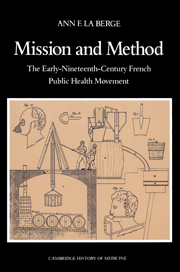Book contents
- Frontmatter
- Contents
- List of tables and illustrations
- Preface
- Acknowledgments
- Introduction
- I Community, method, context
- II Carrying out the mission: Institutionalization, investigation, moralization, and practical reform
- III Public health before Pasteur
- Chapter 8 Public health and public health movements: Comparison and assessment
- Chapter 9 Before Pasteur: Hygienism and the French model of public health
- Epilogue
- Appendixes
- Bibliographical Note
- Index
Chapter 8 - Public health and public health movements: Comparison and assessment
Published online by Cambridge University Press: 17 September 2009
- Frontmatter
- Contents
- List of tables and illustrations
- Preface
- Acknowledgments
- Introduction
- I Community, method, context
- II Carrying out the mission: Institutionalization, investigation, moralization, and practical reform
- III Public health before Pasteur
- Chapter 8 Public health and public health movements: Comparison and assessment
- Chapter 9 Before Pasteur: Hygienism and the French model of public health
- Epilogue
- Appendixes
- Bibliographical Note
- Index
Summary
The early-nineteenth-century public health movement that ultimately spread to many areas of Western Europe and the United States had its origins in eighteenth-century France. The French were the leaders in public health theory and reform up to the 1830s, when the French public health movement reached its culmination. During the 1820s and 1830s there was considerable cross-fertilization of ideas between public health advocates in Britain and France, and British public health leaders such as Edwin Chadwick, Southwood Smith, and William Farr were influenced by French developments. The beginnings of the British public health movement dated from 1837–8, and by the 1840s, the British were enjoying some legislative and administrative success. By the 1850s, the French acknowledged British superiority in practical public health matters, such as sewerage and water supply, and leadership passed from the French to the British. Although Chadwick was familiar with the works of the French hygienists, frequently citing them in his 1842 Sanitary Report, by 1854 Ambroise Tardieu, one of the leading French hygienists and legal medicine specialists, included in his Dictionnaire d'hygiène publique the British parliamentary inquiries of the late 1830s and 1840s into public health conditions as some of the most important public health works the French hygienist should consult. Although the French were the early leaders in public health, the French and British movements developed simultaneously for a while and hence invite comparison.
- Type
- Chapter
- Information
- Mission and MethodThe Early Nineteenth-Century French Public Health Movement, pp. 283 - 315Publisher: Cambridge University PressPrint publication year: 1992
- 1
- Cited by

